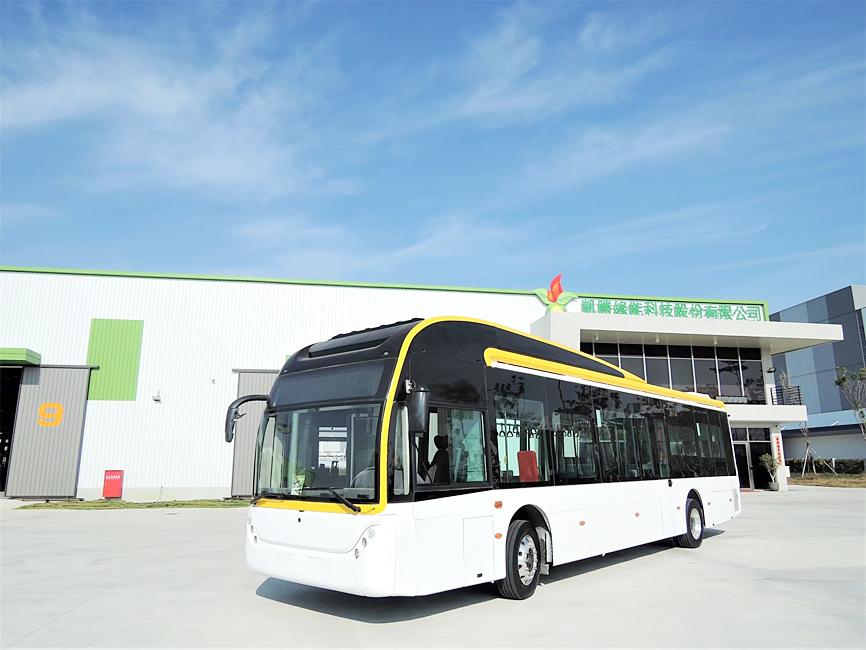Electric bus maker Kaison Green Energy Technology Co (凱勝綠能) has inked a memorandum of understanding (MOU) with Macquarie Formosa Solar Co (麥格理太陽光電) to collaborate on expanding its product portfolio to cover electric vehicles (EV) and electric charging infrastructure areas.
Based on the MOU, Kaison is to focus on developing electric vehicles, including sedans, buses, commercial trucks and scooters, as well as components for charging stations and electricity storage facilities, it said in a filing to the Taiwan Stock Exchange on Tuesday.
Macquarie Formosa Solar, a subsidiary of Macquarie Group Ltd, is to be mainly responsible for providing consultancy on financing and fundraising arrangements, the statement said.

Photo courtesy of Kaison Green Energy Technology Co
The companies did not rule out further deepening their partnership by broadening the scale of operations, it added.
Rechargeable battery supplier Energy Moana Technology Co (能海電能科技) is also included in the collaboration, the statement said.
Energy Moana makes electric scooters powered by chargeable batteries and helps install charging stations.
Kaison, based in Taichung, is the biggest electric bus maker in Taiwan, with a 33 percent market share. As of June, it had sold 173 units and counts Metropolitan Transport Corp (大都會客運) and Taipei Bus Transportation Co (台北客運) as its major customers.
The company in June secured a new NT$240 million (US$8.62 million) order from Fengyuan Bus Transportation Co (豐原汽車客運) after receiving in January an NT$85 million order from Singing Bus Co (新營客運) for electric buses.
Given its limited product offering and manufacturing capacity, Kaison is still struggling to make a profit. The company saw its losses swell to NT$19.34 million in the first six months of this year, compared with losses of NT$16.63 million in the same period last year. That translated to a loss of NT$0.33 per share in the first half of this year, compared with a loss of NT$0.3 per share in the prior year.
Taiwan has the potential to grow its electric bus market over the next 20 years as the Ministry of Transportation and Communications last year set a goal to retire all diesel-powered buses by 2030. The ministry expects the bus electrification program would bring about NT$170 billion in business opportunities for the local electric bus industry, as about 16,000 buses would be replaced.
Separately, Master Transportation Bus Manufacturing Ltd (成運汽車製造) has gained approval from the Central Taiwan Science Park (中部科學園區) to invest NT$2 billion to expand its capacity for manufacturing electric buses, battery modules and electric integration systems in a fab at the science park’s Erlin Township (二林) campus in Changhua County, the science park said in a statement.
Master Transportation received certification in February to participate in a pilot program of electrifying buses initiated by the ministry.

In Italy’s storied gold-making hubs, jewelers are reworking their designs to trim gold content as they race to blunt the effect of record prices and appeal to shoppers watching their budgets. Gold prices hit a record high on Thursday, surging near US$5,600 an ounce, more than double a year ago as geopolitical concerns and jitters over trade pushed investors toward the safe-haven asset. The rally is putting undue pressure on small artisans as they face mounting demands from customers, including international brands, to produce cheaper items, from signature pieces to wedding rings, according to interviews with four independent jewelers in Italy’s main

Japanese Prime Minister Sanae Takaichi has talked up the benefits of a weaker yen in a campaign speech, adopting a tone at odds with her finance ministry, which has refused to rule out any options to counter excessive foreign exchange volatility. Takaichi later softened her stance, saying she did not have a preference for the yen’s direction. “People say the weak yen is bad right now, but for export industries, it’s a major opportunity,” Takaichi said on Saturday at a rally for Liberal Democratic Party candidate Daishiro Yamagiwa in Kanagawa Prefecture ahead of a snap election on Sunday. “Whether it’s selling food or

CONCERNS: Tech companies investing in AI businesses that purchase their products have raised questions among investors that they are artificially propping up demand Nvidia Corp chief executive officer Jensen Huang (黃仁勳) on Saturday said that the company would be participating in OpenAI’s latest funding round, describing it as potentially “the largest investment we’ve ever made.” “We will invest a great deal of money,” Huang told reporters while visiting Taipei. “I believe in OpenAI. The work that they do is incredible. They’re one of the most consequential companies of our time.” Huang did not say exactly how much Nvidia might contribute, but described the investment as “huge.” “Let Sam announce how much he’s going to raise — it’s for him to decide,” Huang said, referring to OpenAI

The global server market is expected to grow 12.8 percent annually this year, with artificial intelligence (AI) servers projected to account for 16.5 percent, driven by continued investment in AI infrastructure by major cloud service providers (CSPs), market researcher TrendForce Corp (集邦科技) said yesterday. Global AI server shipments this year are expected to increase 28 percent year-on-year to more than 2.7 million units, driven by sustained demand from CSPs and government sovereign cloud projects, TrendForce analyst Frank Kung (龔明德) told the Taipei Times. Demand for GPU-based AI servers, including Nvidia Corp’s GB and Vera Rubin rack systems, is expected to remain high,